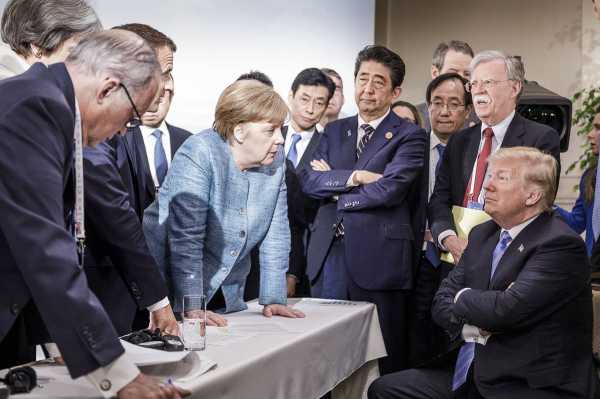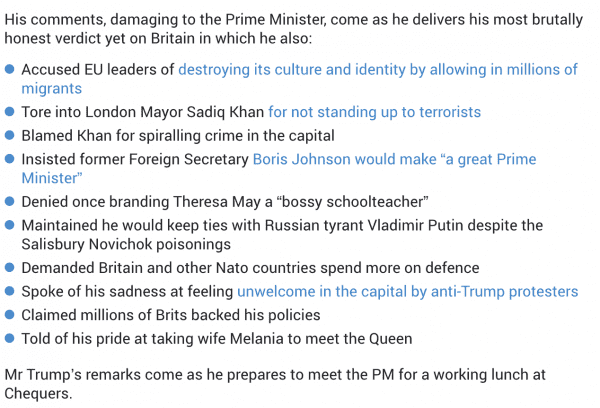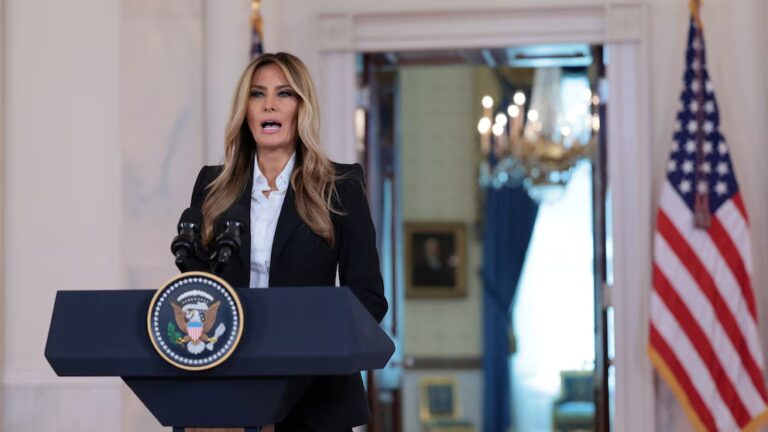
After a disastrous (unless you’re Vladimir Putin) NATO summit, President Donald Trump swung by the United Kingdom to meet with Prime Minister Theresa May.
Trump began the trip by giving an interview to the Sun in which he slammed May’s Brexit strategy as weak and suggested that an insufficiently sharp break with the EU may lead to retaliation by the US in bilateral trade negotiations. But he didn’t stop there. The best way to give the flavor of Trump’s interview, and the chaos it caused in the UK, is with a screenshot of the Sun’s own summation of it (and remember the Sun is a conservative, pro-Trump, Murdoch-owned tabloid):

This was the backdrop for Trump’s meeting with May — and the joint press conference they gave afterward. The press conference was supposed to allay doubts about the strength of the US-UK relationship, and Trump tried to do that: “I give our relationship, in terms of grade, the highest level of special,” he said, and he called reports of his criticisms of May “fake news.” (He was taped; they were not.)
But Trump refused to downplay his very real disagreements. He explained exactly why he so badly wants to see the UK break with the EU, why he is so angered by demands that America spend more than Europeans on common defense, and why he is so quick to attack the leaders of the UK, Germany, NATO, and the EU. The reason Trump is at odds with virtually all of our European allies is that he believes the direction they are taking their countries in is dangerous — for them and also the US.
The most telling exchange came when Trump was asked to explain his comment to the Sun that immigration had damaged the cultural fabric of Europe. It’s worth quoting in full, because as blunt as Trump is about immigration in America, he’s even more straightforward when asked about immigration in Europe:
It’s worth comparing Trump’s answer to May’s response to the same question:
Unlike May, when asked about immigration Trump doesn’t feel the first thing he has to say is that the US, much more so than Europe, has a proud history of welcoming those seeking to build a better life in a new land. No, the first thing he says is, quite literally, immigration has been “very bad for Europe,” and while that may not be a politically correct thing to say, “I’ll say it and I’ll say it loud.”
Trump looks at Europe and he sees a scary vision of America’s possible future: a continent overrun by immigrants, nations giving up their borders to a continental super-government, cultures collapsing under the weight of migration and assimilation and political correctness. (For much more on this view, and how deeply held it is across the Trump administration, read “Trump’s Counter-Jihad.”)
And then Trump looks around, and he’s told America needs to be spending money to defend Europe when the true threat he feels is the very immigrants it’s letting in, that our great allies are in NATO even though Trump doesn’t find any sympathetic voices when he attends those meetings, that America needs to protecting a continent and culture that won’t even protect itself.
The argument Trump is making is an old one, and Trump is not the only major politician to make it. In his 2010 book The Death of the West: How Dying Populations and Immigrant Invasions Imperil Our Country and Civilization, Patrick Buchanan made the precise same point Trump is making, albeit in a clearer way:
Trump might not say it quite this way, but this is both what he is saying and what he is doing. He disagrees with the path that Europe is on, and as such it seems insane to him that America is economically or geopolitically on the hook for it. Trump looks at Brexit, and its fans, and he sees allies — people who look at the world the way he does. Trump looks at NATO and the EU and, if he doesn’t quite see enemies, he sees opponents, people fighting for the doomed, fuzzyheaded cosmopolitan vision that his entire political career is dedicated to destroying.
In his press conference with May, Trump celebrated his efforts to get NATO members to spend more on defense and was perfectly clear that he thought America’s participation was basically charitable. “NATO is really there for Europe much more so than us,” he said. “No matter what our military people or your military people say, it helps Europe more than it helps us.”
Trump is not eroding our European alliances because of personal enmity, and he’s not doing it because he’s a Russian plant (at least, I don’t think he is). He’s doing it because he disagrees with the path Europe is on, and he doesn’t see any benefit to America in following its lead or being enmeshed in its mistakes.
Sourse: vox.com






